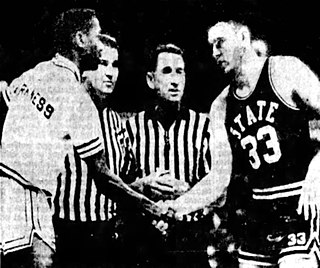
Fielding Lewis Wright was an American politician who served as the 19th lieutenant governor and 49th and 50th governor of Mississippi. During the 1948 presidential election he served as the vice presidential nominee of the States' Rights Democratic Party (Dixiecrats) alongside presidential nominee Strom Thurmond. During his political career he fought to maintain racial segregation, fought with President Harry S. Truman over civil rights legislation, and held other racist views.

The Commercial Appeal is a daily newspaper of Memphis, Tennessee, and its surrounding metropolitan area. It is owned by the Gannett Company; its former owner, the E. W. Scripps Company, also owned the former afternoon paper, the Memphis Press-Scimitar, which it folded in 1983. The 2016 purchase by Gannett of Journal Media Group effectively gave it control of the two major papers in western and central Tennessee, uniting the Commercial Appeal with Nashville's The Tennessean.

The Iowa Bystander was an Iowa newspaper targeted toward an African American audience. It was founded in Des Moines on June 15, 1894, by I.E. Williamson, Billy Colson, and Jack Logan, and it is considered to be the oldest Black newspaper west of the Mississippi. The paper was first called Iowa State Bystander; the term "bystander" given by its editor, Charles Ruff, after a syndicated column "The Bystander's Notes" written by Albion W. Tourgée, a civil rights advocate who wrote for The Daily Inter Ocean. The name was changed to Bystander in 1916 by owner John L. Thompson, who published the paper from 1896-1922. Thompson traveled around the state seeking new subscribers, raising the circulation to 2,000 copies, and changed the paper to a 6-column 8-page layout.

WJTV is a television station in Jackson, Mississippi, United States, affiliated with CBS and The CW. Owned by Nexstar Media Group, the station has studios on TV Road in southwest Jackson, and its transmitter is located in Raymond, Mississippi.
Samuel Holloway Bowers Jr. was an American white supremacist who co-founded the White Knights of the Ku Klux Klan and became its first Imperial Wizard. Previously, he was a Grand Dragon of the Mississippi Original Knights of the Ku Klux Klan, appointed to his position by Imperial Wizard Roy Davis. Bowers was responsible for instigating and planning the 1964 murders of James Chaney, Andrew Goodman, and Michael Schwerner by members of his Klan chapter near Philadelphia, Mississippi, for which he served six years in federal prison; and the 1966 murder of Vernon Dahmer in Hattiesburg, for which he was sentenced to life in prison, 32 years after the crime. He also was accused of being involved in the 1967–1968 bombings of Jewish targets in the cities of Jackson and Meridian. He died in prison at the age of 82.

The Magnolia Gridiron All-Star Classic was an annual post-season college football all-star game held in December 2005 and 2006. The game was organized by Darry Alton, who previously helped found the Las Vegas All-American Classic, in view of the discontinuation of the Blue–Gray Football Classic and the Gridiron Classic, in order to provide players from lesser-known and lesser-televised schools with a chance to impress NFL scouts.

The Jackson Free Press, referred to often as simply "JFP", is a for-profit community magazine available free of charge at various retail establishments in Jackson, Mississippi founded in 2002 and owned by Mississippi native Donna Ladd and author and technology expert Todd Stauffer. It is currently the only member of the Association of Alternative Newsweeklies (AAN) in the state of Mississippi. It is known locally for its annual Best of Jackson awards as nominated by its readers and its online political blogs. It also has sponsored numerous local events such as the Fondren ArtMix, JubileeJam, the Chick Ball, the "Race, Religion & Society Series" and the Crossroads Film Festival.
The Mississippi Business Journal is a statewide weekly business newspaper, located in Jackson, Mississippi.
Jerry W. Mitchell is an American investigative reporter formerly with The Clarion-Ledger, a newspaper in Jackson, Mississippi. He convinced authorities to reopen cold murder cases from the civil rights era, prompting one colleague to call him "the South's Simon Wiesenthal". In 2009, he received a "genius grant" from the MacArthur Foundation.
The Hattiesburg American is a U.S. newspaper based in Hattiesburg, Mississippi, that serves readers in Forrest, Lamar, and surrounding counties in south-central Mississippi. The newspaper is owned by Gannett.

The 1967 Mississippi gubernatorial election took place on November 7, 1967, in order to elect the Governor of Mississippi. Incumbent Democrat Paul B. Johnson Jr. was term-limited, and could not run for reelection to a second term.

On April 13, 1937, Roosevelt Townes and Robert McDaniels, two black men, were lynched in Duck Hill, Mississippi by a white mob after being labeled as the murderers of a white storekeeper. They had only been legally accused of the crime a few minutes before they were kidnapped from the courthouse, chained to trees, and tortured with a blow torch. Following the torture, McDaniels was shot to death and Townes was burned alive.
For the state pageant affiliated with Miss Teen USA, see Miss Mississippi Teen USA

A special election to determine the member of the United States House of Representatives for Mississippi's 4th congressional district was held on June 23, 1981, with a runoff held two weeks later on July 6. Democrat Wayne Dowdy defeated Republican Liles Williams in the runoff by 912 votes. Dowdy replaced Republican U.S. Representative Jon Hinson, who resigned from Congress following his arrest for engaging in sodomy.
The 1974 Jackson State Tigers football team represented the Jackson State University as a member of the Southwestern Athletic Conference (SWAC) during the 1974 NCAA Division II football season. Led by fourth-year head coach Robert Hill, The Tigers compiled an overall record of 7–3 with a conference mark of 4–2, placing third in the SWAC. Jackson State played their home games at Mississippi Veterans Memorial Stadium in Jackson, Mississippi.
The 1962 Jackson State Tigers football team was an American football team that represented Jackson State College for Negroes—now known as Jackson State University as a member of the Southwestern Athletic Conference (SWAC) during the 1962 NCAA College Division football season. In their 11th season under head coach John Merritt, the Eagles compiled an overall record of 10–1 record with a mark of 6–1 against conference opponents, won the SWAC title, defeated Florida A&M in the Orange Blossom Classic, and outscored all opponents by a total of 411 to 101.

The Game of Change was a college basketball game played between the Loyola Ramblers and the Mississippi State Bulldogs on March 15, 1963, during the second round of the 1963 NCAA University Division basketball tournament, at Jenison Fieldhouse in East Lansing, Michigan. Taking place in the midst of the American civil rights movement, the game between the racially integrated Loyola team and the all-white Mississippi State team is remembered as a milestone in the desegregation of college basketball.
The 1938 Mississippi State Teachers Yellow Jackets football team was an American football team that represented the Mississippi State Teachers College as a member of the Southern Intercollegiate Athletic Association during the 1938 college football season. In their second year under head coach Reed Green, the team compiled a 7–2 record.
The 1936 Mississippi State Teachers Yellow Jackets football team was an American football team that represented the Mississippi State Teachers College as a member of the Southern Intercollegiate Athletic Association during the 1936 college football season. In their sixth year under head coach Pooley Hubert, the team compiled a 7–2–1 record.
Mark Perrin Lowrey Love Sr. was a Baptist official and state legislator in Mississippi. He was a Democrat and a Baptist. He married and had six children.










